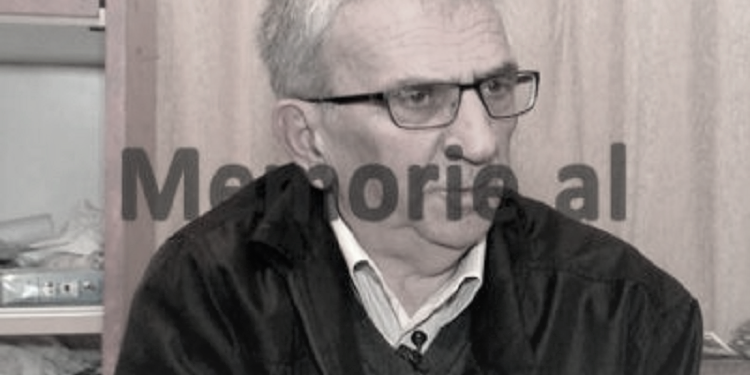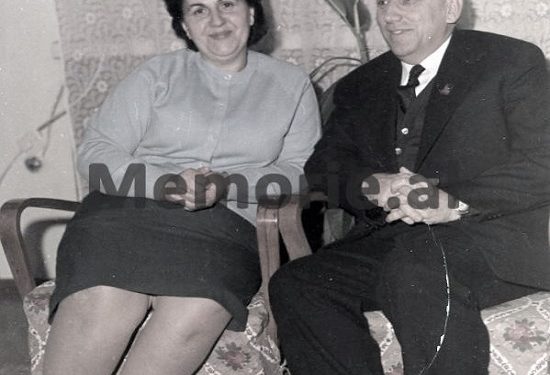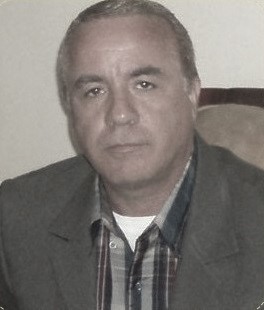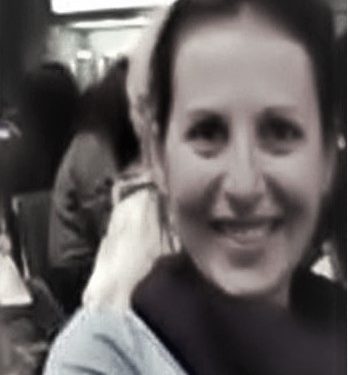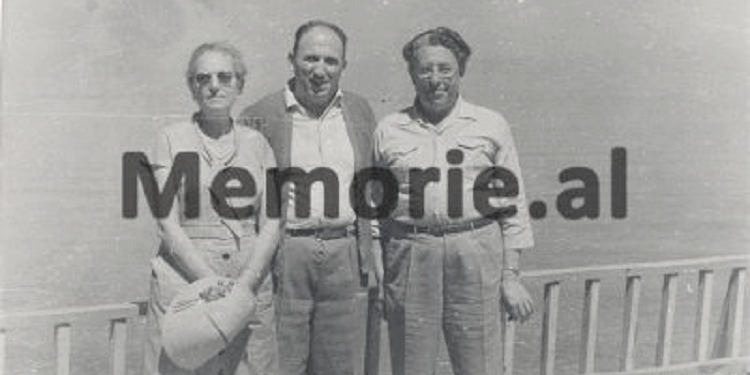By Gëzim Llojdia
Kota, the village of internees who came from the “Block” of the leadership!
Memorie.al / Kota is a village in the administration of the district of Vlora, which. it is located on the edge of Shushica and is no more than 50 years old. It was originally created as a livestock farm of Llakatund, there since 1961. Later, it is separated and becomes a separate Agricultural and Livestock Farm. A kind of union, where those from the villages who could not “eat” the work where they were, found a trick and went down to the farm. Kota, it has been a silent place. From 1920, when the Vlora War took place, a military garrison was placed there and a general was killed there.
According to the historiography of the communist regime before the 90s, it is said that a middle-aged man from the village of Shkozë, named Kanan Maze, during the fight with the Italians, they say that he broke his jaws from a mortar head, exactly where the gate of The farm. The rhapsodists wanted so much that they weaved verses with songs of bravery, where among others it was said: “Kanan Mazeja from Shkoza / with a jaw in pieces / Kanan Maze boyhood, why spoil beauty / I don’t need beauty, when ‘Albania is good’, and to this country that was lost and desolate, they also put sayings such as: ‘Obobo what happened Kota / better than Europe…’!
That’s what they said, that is, the bejtejis during the years of socialism. The name of this village has an interesting and intriguing legend. I have read this from a teacher in Tarbaçiot, years ago, who wrote that; the Italians had set up the trump garrison and called it ‘Kuotë 860 m.’, that was the hill, that being Albanianized, it came and was called from ‘Kuotë’ to Kotë…! Kota has been an internment center for “enemies of the people”. Peta, which was a sector of it, has only been persecuted.
In Kota, sometime from 1975, the deputy prime minister and member of the Political Bureau, Abdyl Këllezi, was interned as a family, who stayed there working first as the director of the Farm and then as a supplier of tractor drivers and tractor drivers, with fuel, until the day that was arrested, to be shot later. The villagers of Kota remember very well that afternoon in May, when they brought two “Skodas” loaded with rags to that small town. In Kota, they say for fights and fights with beatings, everyone gathers. Actually, it was neither.
They had brought the former member of the Political Bureau, the Deputy Prime Minister and the chairman of the Albanian State Plan Commission, Abdyl Këllez. In that farm, the family of Vasil Kati, (Vice Minister of Foreign Trade) was interned and even his daughter, Pranvera, one of the most beautiful girls in the capital, at that time, was said to be considered “Miss Tirana”.
Meanwhile, the sister of Xhevdet Mustafa (the band leader who was killed on September 26, 1982, in a village of Rrogozhina, after landing as a saboteur in the Divjaka Lagoon) and the grandparents of Tedi Papavram, (the violinist of known to have sought political asylum in France.
The old doctor and his wife suffered the “tyranny” of their grandson in that lost village. The farm on the edge of Shushica had its own sector, called Petë, and it had only ordinary internees, as the regime of that time called them, hundreds of families who fled after the 90s, through their villages and cities, or remain there, among the mud in winter and the dust of the marsh in summer.
Deputy Prime Minister Këllezi was with his wife, Safete, as we called her, a noble woman originally from Kosovo, and three sons: Leoni, Ylli and Maksi. As well as the son’s daughter-in-law and a little girl. One of the three children of the deputy prime minister, fell into despair and went through a depression, the whole time of exile. The Deputy Prime Minister was given an extended introduction and after a few days, he started working as the director of Ferma e Kota.
Meanwhile, his three children and the son’s daughter-in-law were employed in government jobs. Abdyl Këllezi, went out on the first day to go to work, in a black suit. He went to the farm and asked: “Where are the forces today, in the wheat harvest, where in Buallar”? He took all the administration staff and got into the cars and left himself. The next day, he repeated this question: “Where are the forces today, quickly, in the wheat harvest in Peta”, and engaged the entire administration, thus restarting a work that made the farm shine.
All these changes were reported above. But it is known that fate was predetermined. This is how the spies, who were not lacking in that farm, responded: “The enemy is working to hide the truth…”! One day he received the news that he was removed from the position of farm manager and appointed fuel distributor, that is, to fight with the Zetorists and drivers that that regime had under its influence. However, that tight-lipped person every day went punctually to open the oil tap and one evening, in the dark, they came from the Department of Internal Affairs of Vlora led by Llambi Pečini and took him.
From that night, he was not seen again, neither at home nor on his way to the small farm. The news of his shooting was heard in a culture hall that had a farm. They had also sent word to the family to come. Wife Safetja and the boys came. The delegate read the letter from the Central Committee of the PPSh, where, among other things, it was said that: “The enemy, Abdyl Këllezi, was sentenced to be shot and executed”, the hall erupted; “Down with the enemy” and slammed his feet on the cement, while his wife’s tears shone.
The next day, the wife, Safeti, put a white scarf on her head, a sign of mourning, according to the tradition of Kosovo, where she is from. From that day, the sons and the son’s daughter-in-law, put you to work, shut themselves up at home and earned a respect, which no one could forget, for education, morals and high standards of life, however much they were provoked, i followed and persecuted them through the darkest jobs, they remained noble to the end, even though in a life of exile.
I, the author of this article, personally knew the three sons of the Këllezi family in exile. The son’s daughter-in-law, Marjeta and little Holta and then Dorian, who was born in that small town. This noble family has been talked about for a long time. Their attitude there has been unparalleled. I, in these few lines, will tell them what they have said little or not at all, in newspapers and television.
Marjeta, Leoni and Ylli managed to achieve two or three rates a day, in the most difficult jobs, such as carpeting, opening the canal, etc. They raised the rate. The rates were raised, but the three of them managed to make three rates per day. In these conditions, Holta Këllezi also grew up, in that small town, which expanded by the river, which has now remained deserted. Today there, in that sector, without drinking water, but with two artificial lakes, only two families live.
Holta Këllezi, the granddaughter of the former member of the Political Bureau, who went into exile for 6 months and ran away at the age of 17
Holta Këllezi, is the granddaughter of the former member of the Political Bureau of the Central Committee of the Albanian Labor Party, who from 1945 to 1975, who was arrested as a “saboteur and enemy of the people”, held a number of other functions party and state, such as: deputy of the People’s Assembly, Chairman of the State Plan Commission, Minister of Finance, Minister of Industry and Deputy Prime Minister, etc.
Holta was born in the “Block” of the leadership in Tirana and when she was only 6-7 months old, together with her parents and the entire Këllezi family, they moved from Tirana and ended up in exile, in one of the agricultural farms in the south of the country. in the village of Kotë in Vlora, where her parents worked in agriculture, while her grandfather, Abdyli, supplied oil to tractor drivers and plow drivers.
After staying there for 16 years, sometime in the beginning of the 90s, the Këllezi family was able to return to Tirana and Holta felt for the first time the taste of being free, since her parents would not show up every morning to the local police, as they had done all those years! The “crests” above her biography would no longer be tarnished, with the signature “granddaughter of the enemy of the people” and as a result, she was educated and graduated from the State University of Tirana and has been living and working in Canada for years.
Ms. Holta, you were born in the former “Block” of the leadership, but you grew up in exile. What can you say about these contrasts?
I have not known the life of the “Block”, since I went to exile for 6-7 months, so I have never been able to distinguish between these lives. I know only one childhood life, that of exile.
You went into exile for about 7 months and left in the 90s. What was life like in exile?
Life in exile was difficult, especially the first years of my childhood, I remember them as very difficult and not in the perspective of the life of my whole family, but in the perspective of a child who tried to have a normal life, but who in every step, he was informed, that he was not like everyone else.
How were your lessons and were they denied their rights as students?
It was a little difficult for him to understand because, at a young age, you cannot perceive why you should be different from others. I remember that until the first grade, no child played with me, and not because they didn’t want to, but because the parents were afraid to let their children play with me. When I went to first and second grade, I started to have friends and I know this thanks to my elementary school teachers, who told the children to hang out with me. Then, growing up, I had very good company, which I continue to keep even now.
How did you think about life, if our country was not opened to Europe?
To be honest, it will probably seem a little strange, but I always believed in those years, with the innocence of a child that, if I learned, I would definitely be given the right to higher education, it never occurred to me, that I would live forever in the village. Maybe it was an inner sense that spoke to me, I know, yes, I have never been pessimistic as a guy. It didn’t occur to me that all those changes would happen, but the fact is that hope keeps a person alive, that’s probably why the motto of my life has always been: “Do everything in your power and the best will happen”
Your parents have suffered enough, two intellectuals, they were sent directly to agricultural work, how did they experience the drama of suffering?
My parents are very dear to me, when you are a child you don’t understand what they have done or what they have achieved in life. Growing up, I understood more and managed to appreciate them to the maximum, not only for the sacrifices they made in life, but above all, for who they are.
Two wonderful people who, although the system hit them very hard, did not change, they remained the same wonderful people. What I appreciate most about them is that they taught me to study and work hard, to be honest, to respect all people, regardless of their background or social status, to have a smile on my face and above all, to don’t hate anyone.
The latter is a great achievement for me, as suffering makes one hate very easily. I want to mention a little about the person with whom I spent most of my time in exile, the person who was the first to come to my defense when someone bullied me and who gave me mental strength, my beloved grandmother, who is no longer live longer I say that I was lucky, that in my life I was raised by parents of this level and by a grandmother, that anyone would envy.
What do you currently get?
Currently for several years, I live in Toronto, Canada, I am married, I have two sons and I work in the field of dentistry. I am happy with my life and I live it to the fullest. Memorie.al




